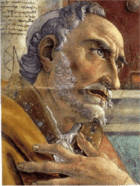
Dear Members of New Covenant,
Good Friday provokes all sorts of questions and emotions for me as I suspect it does for you all. Reading and walking through the Stations this Wednesday one of the pilgrims simply began to cry, perhaps the most appropriate response that can be made.
Common questions are: Why did Jesus have to die? And, how does his death effect my salvation? Over the centuries theologians have grappled with these questions, developing at least a half dozen theories of the atonement, and it’s worth the time to hear even a brief word from one the fathers of our faith. Here’s a brief clip from one of Augustine’s sermons on this topic:
If Christ had not been put to death, death would not have died. The devil was conquered by his own trophy of victory. The devil jumped for joy, when he seduced the first man, and cast him down to death. By seducing the first man, he killed him; by killing the last man, he lost the first from his snare. The victory of our Lord Jesus Christ came when he rose again from the dead, and ascended into heaven. It was at this point that the text from the Book of Revelation, which you heard read today was fulfilled: “The lion of the tribe of Judah has won the day.” (Revelation 5.5). The one who was slain as a lamb is now called a lion, a lion on account of his courage, a lamb on account of his innocence; a lion because he was unconquered: a lamb because of his gentleness. By his death, the slain lamb has conquered the lion who “goes around seeking someone to devour.” (1 Peter 5.8). The devil, on the other hand, is here called a lion for his savagery, rather than his bravery… The devil jumped for joy when Christ died; and by the very death of Christ the devil was overcome: he took, as it were, the bait in the mousetrap. He rejoiced at Christ's death, believing himself to be the commander of death. But that which caused his joy dangled the bait before him. The Lord's cross was the devil's mousetrap: the bait which caught him was the death of the Lord.
Atonement or At-one-ment
An English term originally coined in 1526 by William Tyndale to translate the Latin term reconciliatio, which has since come to have a developed meaning of “the work of Christ” or “the benefits of Christ gained for believers by his death and resurrection.”
Augustine of Hippo (354 – 430)
Widely regarded as the most influential Latin patristic writer, Augustine was converted to Christianity at the Northern Italian city of Milan in the summer of 386. He returned to North Africa, and was made Bishop of Hippo in 395. He was involved in two major controversies: the Donatist controversy over the church and sacraments, and the Pelagian controversy over grace and sin. He also made substantial contributions to the development of the doctrine of the Trinity, and the Christian understanding of history.
Notes: THEOLOGY, Alister E. McGrath
Blessings to you all this day,
Carl+
PS One theologian said Jesus’ theory of the atonement was to invite us to dinner and offer us himself in his body and his blood, at-one-ment with him.
PPS You are invited to join our Lord, at-one-ment, in communion, each of the Great 50 days of Easter.
Monday, Wednesday, Friday -- at 12 noon
Tuesday, Thursday, Saturday -- at 7 a.m.
